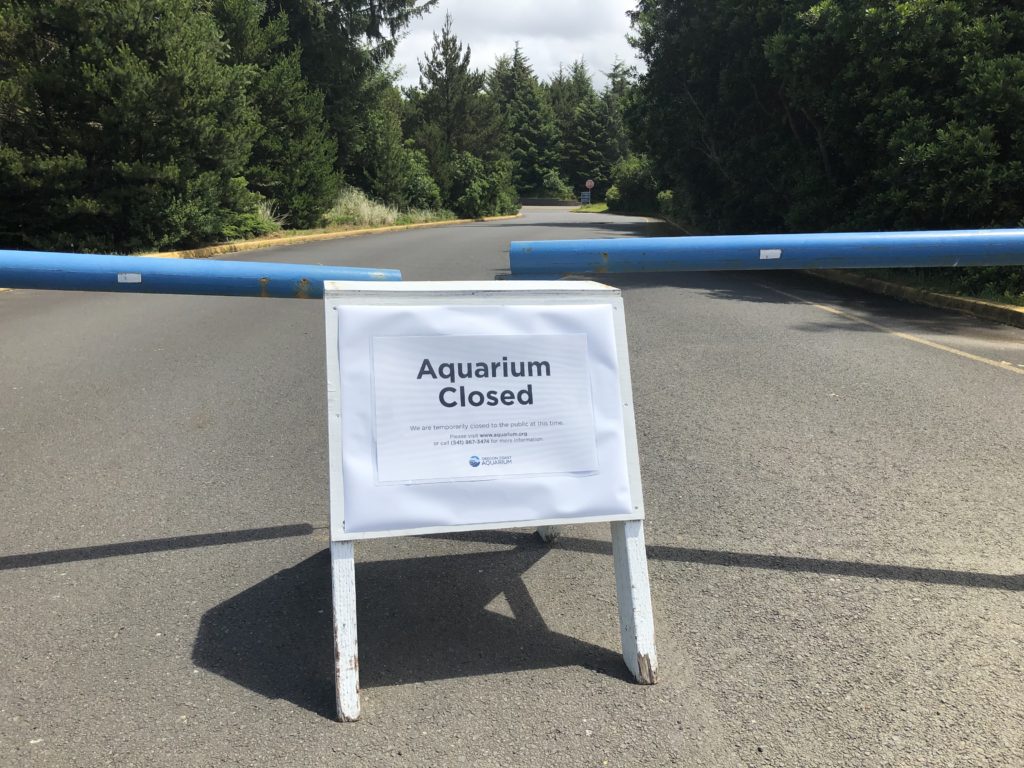
By GARY A. WARNER/Oregon Capital Bureau
A steep drop in Lottery Funds due to the COVID-19 crisis has killed the sale of $273 million in state bonds to pay for major projects — including three in Lincoln County — state officials said Tuesday.
“There’s not enough money — there is no repair,” said Sen. Betsy Johnson, D-Scappoose, a chair on the budget-writing Joint Ways and Means Committee.

The 37 projects authorized by the Legislature at the end of the 2019 session include water system overhauls in Warm Springs and Salem, rehabilitating the Wallowa Lake Dam, a Deschutes Basin piping project, two affordable housing projects, a new YMCA for Eugene and deepening the Coos Bay channel.
Also among the projects which have now lost funding was $4 million to help the city of Newport repair leaks and other issues with its two dams on Big Creek that city officials say are in danger of failing.
The Oregon Coast Aquarium in Newport will not be getting $5 million for its $18 million capital campaign for expansion and renovations, and $1.5 million destined for the Lincoln City Cultural Center is now also gone.
In order to sell bonds, the state has to show a 4-to-1 ratio between forecast Lottery Fund revenue and the amount of debt in the bonds. That has not been a problem in previous budget cycles since the lottery was established in 1984.
Lottery sales sharply declined during the coronavirus crisis that arrived in Oregon at the end of February. The subsequent closing of businesses and the stay-home emergency order for residents kept customers away from venues that sell the state-sponsored games of chance. The Lottery said earlier this month that sales for April were off by 90 percent compared to the year before.
The loss has left the state with a Lottery Fund bonding ratio of just over 3-to-1. That is too low to proceed.
Late Wednesday, Gov. Kate Brown confirmed the bond sale was dead.
“The State Debt Policy Advisory Commission has notified legislative leadership and the Governor there are no longer sufficient funds to issue lottery backed bonds approved during the 2019 session,” said Nikki Fisher, a Brown spokeswoman.
Fisher said Brown and legislative leaders are discussing “next steps” on the projects.
But legislative budget-writers said the nature of the bond sales is “all-or-nothing.” Unlike other discretionary spending that can be reduced to account for lower revenues, the lottery bonds are authorized to be sold as a package.
“It’s all or none,” said Sen. Bill Hansell, R-Athena, a member of the Joint Ways and Means Committee. “If we don’t sell one, we don’t sell any. The lottery revenue has just cratered. We already have debt service on projects funded in earlier cycles.”
The projects do not automatically roll over to the next budget. Each will have to compete again for a diminishing pot of state dollars during the 2021 session.
The bonds were scheduled to be issued in spring 2021, with debt service on the sale beginning in the 2021-23 two-year budget cycle, known as the biennium.
Josh Lehner, an analyst with the Oregon Office of Economic Analysis, forecast in May that the state faced a $2.7 billion deficit in its current budget and a likely $4.4 billion hole for the 2021-23 biennium.
Unlike the federal budget, the state constitution does not allow for deficit spending. The state budget must be balanced.
Brown is expected to call a special session of the Legislature as early as later this month to deal with budget cuts, increases in taxes and fees — or both — to fill the gap.
Lehner said that after losing nearly all its revenue in April and May, the Oregon Lottery has rebounded with the “reopening” of businesses over the past few weeks. Lottery revenue has recently rebounded to about 90 percent of normal.
Officials don’t yet know if the uptick in lottery play might be a short-term spurt of pent-up demand or a long-term return close to prior levels of spending. The fragility of the reopening and the possibility of future shutdowns as COVID-19 infections rise again make forecasting difficult.
Some of the major projects affected include:
- Affordable housing preservation: $25 million
- Salem drinking water improvements: $20 million
- Eugene YMCA: $15 million
- Affordable Market Rate Housing Acquisition Program: $15 million
- Levee Grant Program: $15 million
- Port of Coos Bay channel deepening project: $15 million
- Water supply development: $15 million
- Wallowa Lake Dam rehabilitation: $14 million
- Southern Oregon Workforce Center, Roseburg: $10 million.
- Deschutes Basin Board of Control piping project: $10 million
- Warm Springs water improvements: $7.8 million
- Blue Mountain Community College Facility for Agricultural Resource Management: $6.5 million
The Oregon Capital Bureau in Salem is staffed by reporters from EO Media and Pamplin Media Group and provides state government and political news to their newspapers and media around Oregon, including YachatsNews.com


